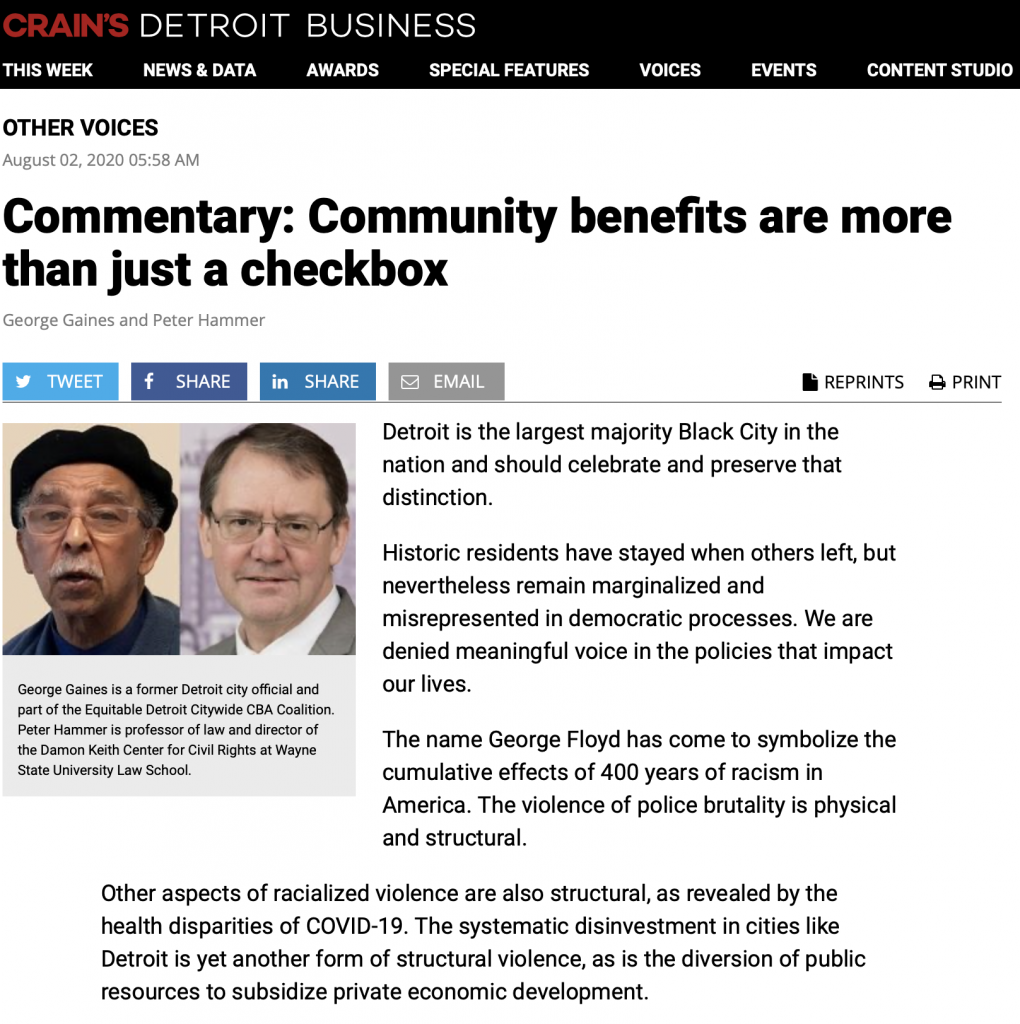Call for Racial and Economic Justice
Principles for Corporations Negotiating Community Benefits Agreement (CBAs) with Residents in the City of Detroit
Preamble
Detroit is the largest Majority Black City in the country, with the intention of celebrating and preserving that distinction. Historic residents have stayed when others left, but nevertheless remain marginalized and mis-represented in democratic processes. We are denied meaningful voice over the policies that impact our lives.
The name George Floyd has come to symbolize the cumulative effects of four-hundred years of racism in America. The violence of police brutality is physical and structural. Other aspects of racialized violence are also structural, as revealed by the health disparities of Covid-19. The systematic disinvestment in cities like Detroit is yet another form of structural violence, as is the diversion of public resources to subsidize private economic development. During the past decade corporations doing development in Detroit by our estimates have been awarded nearly $1.5 billion dollars in tax abatements (mostly concentrated in the downtown business district). And yet, Detroit remains one of the nation’s most impoverished cities. It is obvious that majority Black Detroit is not benefitting from these public investments.
In this national moment, business as usual is no longer acceptable. Existing processes are structurally flawed and fundamentally unfair. We need to adopt new practices to ensure more equitable outcomes. How corporations engage with Detroit residents is a good place to start to repair these long-standing injustices.
The Equitable Detroit Coalition calls on corporations receiving public subsidies and engaging in negotiations for Community Benefit Agreements (CBAs) to commit to the following principles:
Demonstrate Corporate Commitment to Racial Equity
Racial Equity is both a process and an outcome. 1) As a process, we apply racial equity when those most impacted by structural racial inequity are meaningfully involved in the creation and implementation of the institutional policies and practices that impact their lives. 2) As an outcome, we achieve racial equity when race no longer determines one’s socioeconomic outcomes (Center for Social Inclusion).
Corporate Commitments to Racial Equity as a Process
- Respect the community. The community has deep expertise that others lack, particularly about the impact of development on the neighborhood and the needs of the people.
- Be transparent. Be forthcoming and timely with information and honest about your plans and intentions. Engage community early, not after all decisions are made.
- Engage authentically in the proces Negotiating Community Benefits Agreement (CBAs) is not a check box activity. The Community Benefits Agreement (CBA) process is an opportunity for building racial equity.
- Take the time needed to do it right. Racial equity cannot be rushed. There is nothing in the Detroit’s Community Benefits ordinance that prevents a corporation from spending more time in the negotiating process than designated.
- Act in good faith. Acting in good faith requires a commitment to good will and the exercise of best efforts, an admonishment against forms of opportunistic and exploitive behavior and clear standards of accountability towards the community.
Corporate Commitment to Racial Equity as Substantive Outcomes
- Commit to a fair rate of community return on the public investment. Outcomes of Community Benefits Agreements (CBAs) should reflect the principle of reciprocity. Community Benefits should meaningfully correspond to the size of the public subsidy.
- Commit holistically to enhancing the quality of life in the Detroit neighborhoods along a number of dimensions – environment, housing, education, employment, recreation and youth and senior services.
- Commit to do no harm.
- Commit to accepting the Community Benefits Agreement as binding and agree to forfeit the value of the public subsidies if the conditions of the Agreement are not met.
Racial equity is achieved when race no longer determines one’s socioeconomic conditions. Corporations should commit to using Community Benefits Agreements to support quality developments in the neighborhoods they are subsidized to invest in so that these neighborhoods will look like the neighborhood that their executives go home to at the end of the day
A version of this document appears as a Commentary in Crains Business Detroit. as "Community Benefits are more than just a checkbox" by George Gaines and Peter Hammer.
George Gaines is part of the Equitable Detroit Citywide CBA Coalition. Peter Hammer is professor of law and director of the Damon Keith Center for Civil Rights at Wayne State University Law School.
